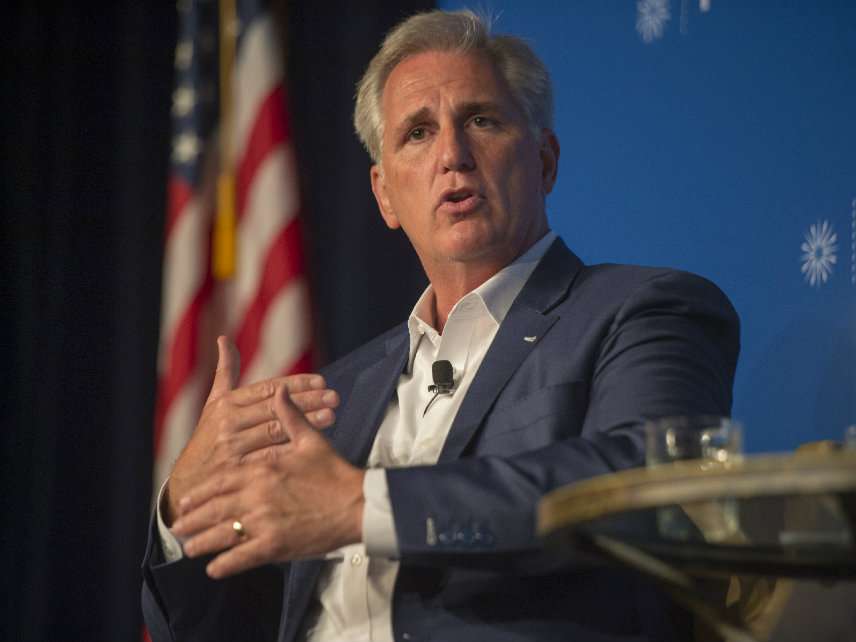Kevin McCarthy Shows Why the Government Shouldn't Regulate Social Media
The House majority leader doesn't understand how Twitter works.

House Majority Leader Kevin McCarthy (R-Calif.) accused Twitter last week of censoring content from Fox News host Laura Ingraham. It turns out that McCarthy's own account settings were to blame.
On Friday, McCarthy posted a screenshot of an Ingraham tweet that blamed a rise in violent crime in Sweden on migration from the Middle East. The tweet's content wasn't showing up "because it includes potentially sensitive content."
Another day, another example of conservatives being censored on social media. @jack easy fix: explain to Congress what is going on. #StopTheBias cc @IngrahamAngle pic.twitter.com/QjzpmfadXS
— Kevin McCarthy (@GOPLeader) August 17, 2018
As multiple users pointed out, Twitter was not in fact censoring Ingraham. McCarthy simply had to change his settings to allow "sensitive content."
Congressman, it's your settings. Go into "settings and privacy" and uncheck this box so you can see these kinds of tweets. pic.twitter.com/Zi4w3BLVZ4
— Walter Shaub (@waltshaub) August 18, 2018
All you need to do to see Ingraham's racist tirades is to go to Settings > Privacy and Safety and switch the Safety settings at the bottom to look like this. You're going to hold Congressional hearings to demand that CEOs give you tech support now? pic.twitter.com/MIIlOY4uAM
— Greg Fish (@GregAFish) August 18, 2018
Among those who mocked McCarthy for not understanding Twitter was House Minority Leader Nancy Pelosi (D-Calif.):
Rather than adjust his Twitter settings, Kevin McCarthy chooses to perpetuate an outrageous conspiracy theory. Shows he sadly doesn't know how to use the platform. That's insane. pic.twitter.com/sEwo1pkYLs
— Nancy Pelosi (@TeamPelosi) August 19, 2018
McCarthy fired back at his Democratic counterpart, claiming she "has no idea what is going on." The California Republican also argued that Ingraham's original post shouldn't have been "considered 'potentially sensitive content'" in the first place.
Once again Nancy has no idea what is going on. https://t.co/HTWh7OM4qR
— Kevin McCarthy (@GOPLeader) August 20, 2018
There is no reason @IngrahamAngle's tweet should be considered 'potentially sensitive content' #StopTheBias pic.twitter.com/9QDVw30zX9
— Kevin McCarthy (@GOPLeader) August 20, 2018
This isn't the first time McCarthy has accused Twitter of an anti-conservative slant. After Vice reported late last month that Twitter was "shadow-banning" several conservative leaders, McCarthy said: "The bias has to stop." Twitter pushed back on the "shadow-banning" allegations, and CEO Jack Dorsey has maintained that though his individual employees are more likely to lean left, the platform itself does not censor conservatives.
In this case, a McCarthy spokesperson tells the Washington Examiner that he was simply trying to point out the extra step users needed to take in order to see Ingraham's tweet. But even if we accept that rather loose use of the word censored, a little digging would show that conservatives aren't exactly the only people running into this problem. The underlying issue here is that Twitter is really bad at identifying "sensitive content," even as various constituencies demand that it do more to shield them from content they dislike.
But lawmakers like McCarthy don't care about Twitter's general inability to curate content competently—not when there's partisan grandstanding to be done. McCarthy wants to control Twitter, but he doesn't even understand how the platform works. Add that to the general problem that technology tends to move more quickly than the rules devised to govern it, and this little affair becomes a deeper lesson in the dangers of lawmakers regulating internet platforms.


Show Comments (151)